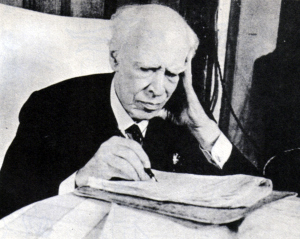There is an art to living well and to leading well. And whether in politics, in business, or in acting on a stage, the same ethics and same temptations can equally apply. So while delivering a speech to a captive business or political audience hardly reaches the height of reciting lines from Shakespeare or Chekhov, too often and no matter which venue, the person who is performing believes they are speaking the words of genius.
Perhaps that is why, as I was recently reading Constantin Stanislavski’s Building a Character and came across the following excerpt, I couldn’t help but think of the politicians I see everyday acting out their insecure and coveted roles on TV.

Constantin Stanislavski in 1938. (Source: https://uttaps.wordpress.com/actor-prepares/stanislavski-the-moscow-art-theater-a-timeline/)
“An actor is on view every day before an audience of a thousand spectators from such and such an hour to such and such an hour. He is surrounded by the magnificent trappings of a production, set against the effective background of painted scenery, dressed often in rich and beautiful clothes. He speaks the soaring lines of geniuses, he makes picturesque gestures, graceful motions, produces impressions of startling beauty – which in large measure are brought about by artful means. Always being in the public eye, displaying his or her best aspects, receiving ovations, accepting extravagant praise, reading glowing criticisms – all these things and many more of the same order constitute immeasurable temptations.
“These breed in an actor the sense of craving for constant, uninterrupted titillation of his personal vanity. But if he lives only on that and similar stimuli he is bound to sink low and become trivial. A serious minded person could not be entertained for long by such a life, yet a shallow one is enthralled, debauched, destroyed by it. That is why in our world of the theatre we must learn to hold ourselves well in check. We have to live by rigid discipline.
“If we keep our theatre free from all types of evil we, by the same token, bring about conditions favourable to our own work in it. Remember this practical piece of advice: Never come into the theatre with mud on your feet. Leave your dust and dirt outside. Check your little worries, squabbles, petty difficulties with your outside clothing – all the things that ruin your life and draw your attention away from your art.”
“Excuse me for pointing this out,” interrupted Grisha, “but no such theatre exists in the world.”
“Unfortunately you are right,” admitted Tortsov. “People are so stupid and spineless that they still prefer to introduce petty, humdrum bickering, spites and intrigues into the place supposedly reserved for creative art.
“They do not seem to be able to clear their throats before they cross the threshold of the theatre, they come inside and spit on the clean floor. It is incomprehensible why they do this!”
(From the chapter “Toward an Ethics for the Theatre”)


